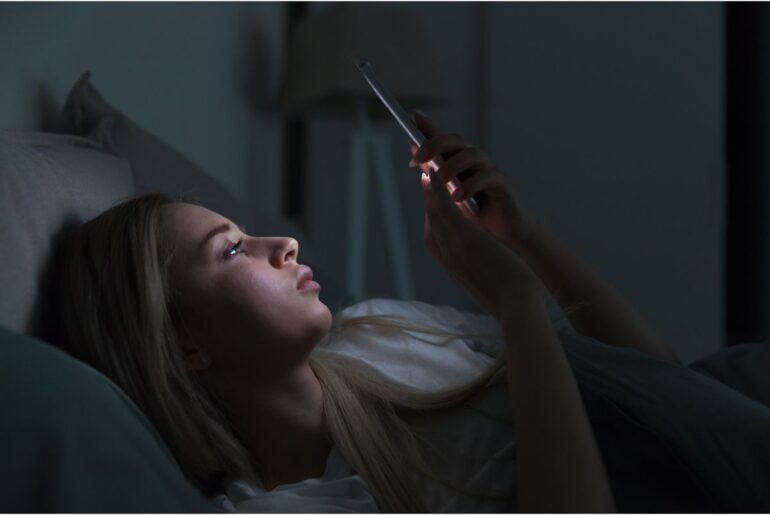Teen mental health struggles have been on the rise for many years, with many experts and studies pinpointing the advent of social media as a major cause. But there may be another, more insidious culprit that also goes hand-in-hand with excessive screen time: sleep deprivation.
AAP guidelines state that teens need 8-10 hours of sleep per night, yet 70 percent of teens get less than that. Sleep, screens, and mental health are linked in more ways than you may realize, and can create a vicious cycle that is very difficult for adolescents to break away from. Screens can cause kids and teens (and adults!) to lose sleep for a number of reasons:
- Screen time has been proven to delay the release of melatonin, and kids and teens are even more sensitive than adults to the blue light that screens emit.
- Fast-paced internet content and video games are overstimulating and interfere with natural sleep cycles.
- Tech and media is designed to be addictive, and teens/tweens often prefer to scroll social media or play video games than go to bed.
- Heavy social media use is proven to be linked to depression and anxiety, which can also worsen sleep.
The allure of screens over sleep
Paul Weigle, MD, a board certified child and adolescent psychologist, says that through his work, he has found that teens simply aren’t invested in getting good sleep. “When I was working with a boy who would stay up all night in his room playing video games, I suggested to his mother that she move his gaming console into the living room. She did it, but to my surprise, he was sleeping no better. Then she clarified what was happening: ‘He never goes into his room anymore, just spends all night gaming in the living room,’” Weigle said.
The fact is, the temptation of screens is simply too much for vulnerable teens to resist in favor of a good night’s sleep. Social media companies send push notifications at all hours, which makes it extremely difficult for kids to disconnect from their device. And the social pressure to keep their Snapstreaks with friends alive, for example, is going to win out over turning off the lights. But the good news is that there are some relatively simple ways you can help your teen get a better night’s rest:
- Keep all devices silenced and charging outside of kids’ and teens’ bedrooms at night (in your bedroom can be a good option). Relocating the phone after hours can prevent exposure to online safety harms when parents are asleep and unable to monitor as closely.
- Start screen-free time at least 1 hour before bedtime, and turn off the WiFi altogether if you have to!
- Turn off push notifications for any nonessential apps. This will help prevent near-constant phone usage at all times of the day — it’s a helpful habit for adults, too.
Remember: If your family struggles with any of this, know that it’s not your fault. Today’s media is designed to keep all of us hooked as much and as long as possible. But hope is not lost — even small, consistent changes can make a significant difference in your teen’s sleep habits and overall mental health. By prioritizing sleep as a family and openly discussing the real impacts of screen time on rest and wellbeing, you’re taking important steps toward breaking the cycle.







